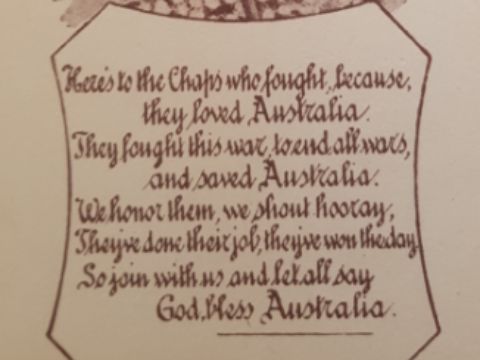- A Charles Sturt University Islamic history scholar honours the service of all Australians in wars, including multi-ethnic Australian Muslim service personnel
- His new book chronicles how Muslims, despite encounters with bias, bigotry and discrimination, gradually built their attachment to Australia due to opportunities, prosperity and positive life experiences here
- The social virtues of Muslim ‘loyalty, patriotism, and contribution’ are interconnected and an integral part of Australian social cohesion
As ANZAC Day approaches, a Charles Sturt University Islamic history expert says gratitude must go to all Australians, including Australian Muslim service personnel of different ethnicities, for their service and sacrifice – Lest We Forget.
Dr Dzavid Haveric (pictured inset, above), Adjunct Research Fellow in the Charles Sturt Centre of Islamic Studies and Civilisation has researched extensively the history of Muslim Australians’ service in the Australian military.
His research has unearthed important facts, archival data, interesting stories and precious testimonies contradicting many stereotypes, and he is the author of the forthcoming book A History of Muslims in the Australian Military: Loyalty, Patriotism, Contribution (2024).
Dr Haveric said as an Australian Muslim historian, for ANZAC Day he wishes to honour the service of all Australians in wars, including Australian Muslim service personnel of various ethnicities.
“The social virtues of Muslim ‘loyalty, patriotism, and contribution’ which I found in my research and are in the book’s title are in many respects interconnected, and certainly they are an integral part of Australian social cohesion,” he said.
“My experience, through gathering the first-hand information, confirms that descendants and friends of Muslim soldiers and representatives proudly cherish such traits in Australian spirit with other Australian veterans.
“The Muslim contribution in the Australian military should be known more broadly in the scholarly domain, and among the Muslim communities and the public, particularly among younger generations.”
Dr Dzavid Haveric explains the progression of the book’s subtitle … Loyalty, Patriotism, Contribution.
He said loyalty to Australia developed because it was a social process which started from the heart.
“Muslim loyalty is a love for the country, Australia,” Dr Haveric said. “By migrating, living, and working in Australia, Muslims gradually built their attachment to Australia.
“Those born in Australia were mainly the second generation who were raised, educated, and worked as young Aussies.
“During the two World Wars, their love for the country also meant helping Australia in its epic times.”
He said this was due to opportunities, positive life experiences and prosperity in Australia, despite encounters with bias, bigotry and discrimination.
“One prominent Australian Muslim said, ‘We [Muslims] are loyal to Australia – why shouldn’t we be? – Australia has given us all we have’,” Dr Haveric said.
“Yes, due to the White Australia Policy, Muslims experienced stigma and social exclusion in public life associated with the Immigration Restriction Act and with their quest for their naturalisation.
“However, their loyalty was beyond their struggles, as they wanted to make better living conditions for themselves and at the same time to contribute to Australia, including its military.”
Dr Haveric said building their better life for the future inspired Australian Muslims to express their patriotic feelings.
During wars, the Australian army galvanised Muslim patriotism into more intense patriotic activities, from their voluntary enlistment in the Australian military to their contribution to patriotic funds, the Red Cross, and hospitals.
“There are many patriotic examples,” he said. “For instance, some Muslims offered their services, saying, ‘they would fight for Australia to a man’. Another stressed, ‘I would gladly give my last penny, and, if necessary, the lives of myself and my son’.
“They offered camels free-of-charge to be used in the Great War in Egypt. Muslim women sewed and knitted garments for the soldiers.”
Dr Haveric said it was their loyalty and patriotism that led them to contribute to the Australian military.
“In World War I a few Muslims fought in the Gallipoli campaign, and a number of them in the Western Front, while in World War II their number was larger in many theatres of the war,” he said.
 “They fought with other Australians against their common enemies, above any potential ‘complicating ties’ in the Muslim world. They put Australia ahead of any individual considerations.
“They fought with other Australians against their common enemies, above any potential ‘complicating ties’ in the Muslim world. They put Australia ahead of any individual considerations.
“They believed no greater effort could be made to enable them to take their rightful place in the country which they had fought for. They defended Australia’s freedom, democracy, and integrity. Some of them gave their lives for the honourable cause.”
Dr Haveric cited the example of Muriel Howsan (pictured left), a Muslim woman civilian pilot, whose brother Sergeant Moheddeen ‘Bob’ Howsan was killed in WWII serving in the RAAF; she wrote the following patriotic lines:
 Here's to the chaps who
fought because,
Here's to the chaps who
fought because,
they loved Australia.
They fought this war to end all wars,
And saved Australia.
We honour them, we shout hooray,
They have done their job, they won the day,
So join with us and let all say
God bless Australia.
Lest We Forget.






Social
Explore the world of social